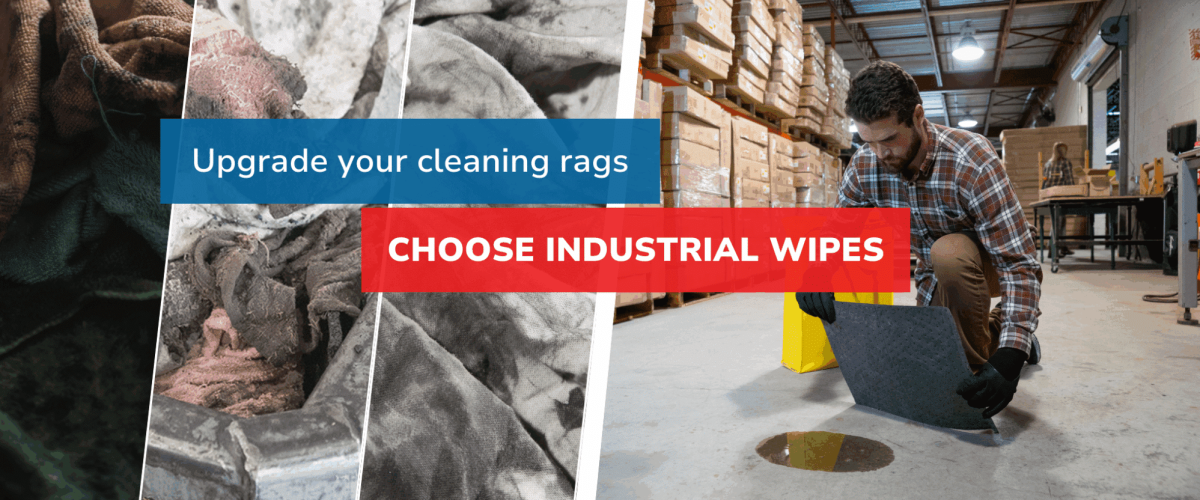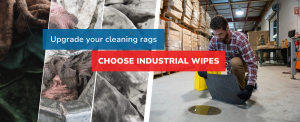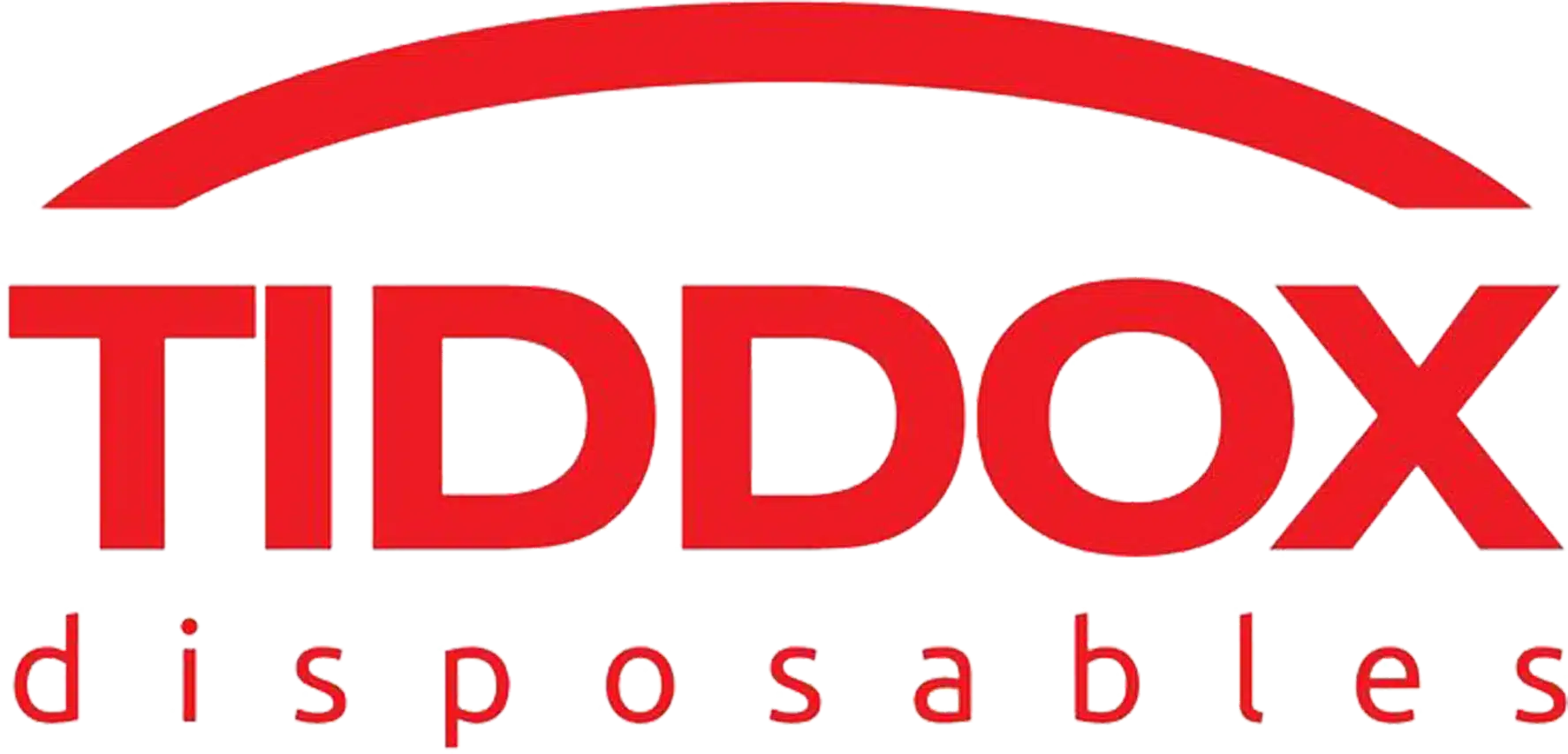Industrial Cleaning Wipes as an Alternative to Rags

Table of Contents
Industrial cleaning wipes are an effective alternative to cleaning rags, offering many benefits. Unlike rags, which are recycled from used clothing and limited to general-purpose cleaning, these wipes are specifically designed for targeted tasks and applications.
There are many reasons why more businesses are switching from bags of rags to industrial wipes. These advantages include consistent size and performance, better hygiene, increased convenience, and enhanced safety, as rags may contain buttons, zippers, or pins that can cause damage or scratches.
What are Industrial Wipes?
Compared to domestic household wipes, industrial wipes are made for heavy-duty cleaning tasks. Manufacturers purposely design these wipes using absorbent natural fibres and durable synthetic material. As such, they are ideal for cleaning machinery and equipment, surface preparation tasks, and soaking up chemicals, grease, oils, and solvents.
What are Rags?
Rags are old clothing items repurposed into cleaning materials. They are cut from discarded clothing, such as t-shirts, cotton shirts, dresses, flannel shirts, fleece jackets, old bath towels, and sheeting. While not originally intended as cleaning materials, clothing has good absorbency and soft textures, making it suitable for specific cleaning tasks.
Consequently, it is not surprising that rags come in different shapes, sizes, thicknesses, and textures. As a result, their absorption and performance do vary. Additionally, since these items are typically unwashed, they lack the hygiene of industrial wipes.
It’s important to note that unless these items have been scanned under a metal detector before packing, they may contain hazardous materials such as zips, pins, and buttons. Because bags of rags are bulky, they tend to be more expensive to transport and store compared to wipes.
What are the Benefits of Using Industrial Wipes Instead of Rugs?
Highlighted below are some of the key differences and benefits of industrial wipes in comparison to material rags:
| INDUSTRIAL WIPES | RAGS |
| New, clean, and hygienic | Used, less hygienic, not always washed |
| Consistent, standard size and shape | Inconsistent size, shape, and texture |
| Safe to use and will not scratch surfaces | May contain buttons, zips, or pins that may cause harm or damage to surfaces |
| Less wastage, more economical | Higher wastage; not all rags are suitable |
| Designed to be low-linting / lint-free | Threads can cause lint residual |
| Lower cost per use | Higher cost per use (many unsuitable) |
| Greater absorbency and effectiveness | Not as absorbent or as effective |
| Easier to store and cheaper to freight | Bulky and less easy to store and freight |
What are Industrial Wipes used for?
Industrial wipes are designed for tough, demanding tasks like cleaning machinery and equipment, removing stubborn dirt, absorbing chemical spills, and wiping away grease, oil, and grime. They are used across various industries, including automotive, engineering, mining, manufacturing, and printing.
Outlined below are some of the applications of industrial wipes:
| Industry | Application |
| Automotive and Transport | Mechanics and panel beaters use industrial wipes to clean vehicles, trucks, engines, tools, and hands. |
| Aviation | Industrial wipes and pads absorb spills, fluids, chemicals, oil, and solvents. |
| Commercial Cleaning | Industrial wipes remove dirt and can be used with cleaning chemicals. |
| Engineering and Manufacturing | Workshops use industrial wipes for surface preparation and clean machines and hands. |
| Food Production | Lint-free wipes are used to clean hoppers and vats. |
| Marine and Mining | Heavy-duty industrial wipes are used to clean machinery and absorb spills, oils, and chemicals. |
| Printers | Printers use industrial wipes as they leave less lint than rags. |
Are Industrial Wipes lint-free?
Unlike rags that shed cotton threads and lint, manufacturers use nonwoven processes to produce wipes, minimizing the risk of loose fibres. Techniques such as spinning, air-laid, and dry-laid processes specifically reduce linting in these wipes.
What are the Best Industrial Wipes?
The best wipes do the job efficiently and effectively. For best results, match the task with the appropriate type of industrial wiper. For example, there are task-specific lint-free wipes for surface preparation, while others are designed for oil absorption and grease removal.
Below, we discuss some more popular industrial wiping products and their applications.
Rhino Wipes
As the name suggests, RHINO WIPES are strong, durable, and absorbent. Tough by name and tough by nature! Rags are no match for these high-performing industrial wipes.
Made from thick, absorbent polypropylene cellulose nonwoven material, these heavy-duty wipes are tear-resistant and very absorbent of oil, solvents, grease, and chemicals. Their strength, durability, and absorbency make them popular in automotive, transport, mining, and engineering businesses. They are ideal for businesses looking for a quality solution to replace rags to clean equipment, tools, and hands.
These low-lint, solvent-resistant wipes are ideal for surface preparation and other lint-sensitive industrial wiping tasks, such as precision cleaning jobs in engineering and fabrication or surface cleaning in sign manufacturing. Even food production businesses looking to avoid lint residue use this brand to clean out hoppers, vats, and food fillers.
RHINO WIPES are a popular alternative to Kimberley Clarke’s Wypall X60, X70, and X80 products. They come in three different thicknesses and are available in blue or white, either in a centre feed roll, dispenser box, or jumbo roll format.
Jumbo Rolls of Industrial Wipes
For high-usage areas, bulk packaging industrial wipes on a jumbo roll offer the best economical solution. Jumbo rolls of wipes are more compact than rags and offer better all-around performance. They can also be neatly stored away on wall or floor dispensers.
Because of these and other benefits, the trend of replacing rags with jumbo rolls of industrial wipes continues to grow in workplaces across Australia.
The 1000-sheet, 3-ply blue TIDDOX INDUSTRIAL PAPER TOWEL ROLL is the most cost-effective jumbo roll. Its price point is hard to beat! These general-purpose workshop towels are great for cleaning hands and tools and wiping down equipment in automotive and industrial workshops. The thick square perforated paper shop towels are absorbent of spills, chemicals, fluids, grease, and oils.
If the task requires material thicker than paper, the CLASSIC GREEN JUMBO ROLL has 600 thick, absorbent spunlaced wipes, ideal for general-purpose cleaning jobs and spill absorption.
We recommend either the BLUEMAX WIPES JUMBO ROLL or the previously mentioned RHINO WIPES JUMBO ROLL for lint-sensitive jobs or more challenging tasks. Each has about 500 thick, absorbent wipes that are tear-resistant and ultra-low linting. These strong, industrial-grade wipes are solvent-resistant and absorbent of lubricants, chemicals, oils, and grease. Hence, they are popular in workshops for cleaning machinery and equipment, removing stubborn grime, and preparing surfaces on metal or glass surfaces.
Industrial Wipes for Hazardous Spills of Oil and Grease
We have found that PROPREP WIPES are the ultimate rag substitute for grease and oil. They offer consistency in performance and absorption that rags cannot. Made from 100% polypropylene, these degreasing wipes soak up oil and grease effortlessly and absorb solvents, chemicals, and inks. Whether cleaning oily and greasy machinery, spray painting, or surface preparation, these thick, melt-blown oil absorbent wipes are ideal and low-linting. They are easily dispensed from portable carry boxes.
For thicker-flow hazardous floor spills of oils, fluids, and chemicals, HAZPADS are a more professional solution than rags. These thick general-purpose absorbent pads each hold about 0.6 litres of oil or water.
The orange SUPERMAX ABSORBENT PAD is another rag replacement product used for floor clean-ups and spills. It is easy to spot and has a huge absorption capacity to quickly soak up oil, petrol, and diesel spills. It is popular in automotive garages as oil drop sheets under trucks and vehicles.
Lint-Free Industrial Wipes
Rags are notorious for shedding lint during vigorous scrubbing and cleaning. We recommend using lint-free wipes for precision cleaning, surface preparation, or any other lint-sensitive applications. There are industrial wipes that are specifically designed for such tasks, and they outperform rags.
TIDDOX designs and makes its own range of industrial wipes and has many lint-free and ultra-low-linting products. For example, the MICROMAX WIPES and AMBIWIPES are ideal for surface preparation and cleaning glass and metal surfaces. It also has ultra-low-linting SOLVENT RESISTANT WIPES for cleaning delicate surfaces with cleaning chemicals.
Using task-specific wipes significantly reduces the risk of contaminating surfaces with lint.
Final Thoughts
With modern technology, industrial wipes can be engineered to meet the demands of specific tasks and applications. There is no longer a need to rely on recycled cleaning rags when more sophisticated task-focused wipes are available. As a result, more and more industries are choosing to replace rags with industrial wipes, and the growing demand underpins the benefits of making such a switch.
FAQ’s
Q: What are Industrial Wipes?
A: Industrial wipes are nonwoven materials designed to be thicker, stronger, and more absorbent than regular wipes, making them better suited for challenging cleaning tasks.
Q: What are Rags?
A: Rags are recycled, used clothing repurposed for cleaning tasks. T-shirts, cotton, flannel, fleecy clothing, and towels are very absorbent, soft, and non-abrasive. Hence, they are often cut up and used as cleaning rags.
Q: Are Industrial Wipes Lint Free?
A: Using special nonwoven manufacturing techniques, industrial wipes can be made ultra-low-linting and colloquially referred to as “lint-free.” Using air, spun, and dry-laid nonwoven processes reduces the risk of loose fibres in wipes.
Share This Post
More To Explore

TIDDOX Cleanroom Wipes – High-Performance Wiping Solutions for Critical Environments
At TIDDOX, we supply premium-grade cleanroom wipes for industries that require strict contamination control. Our selection includes sterile and non-sterile

Industrial Cleaning Wipes as an Alternative to Rags
Industrial cleaning wipes are an effective alternative to cleaning rags, offering many benefits. Unlike rags, which are recycled from used



